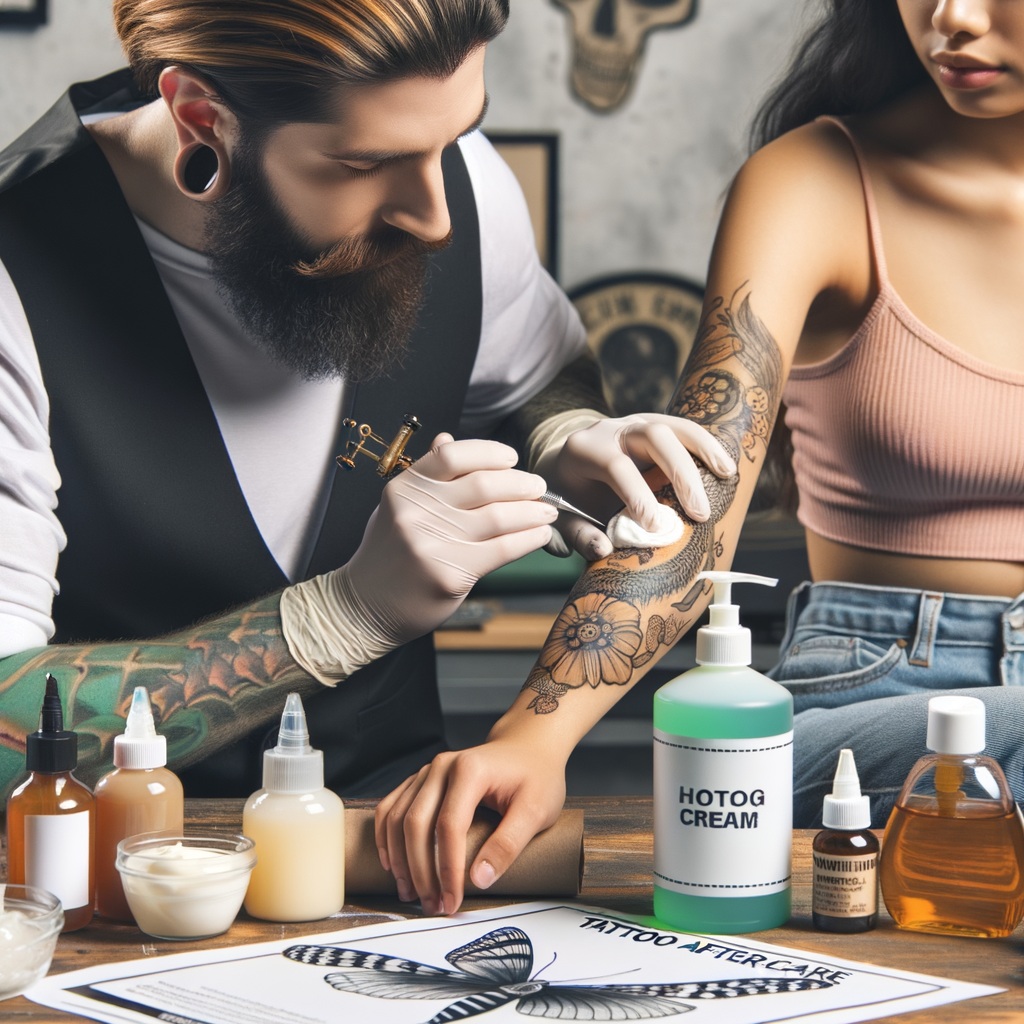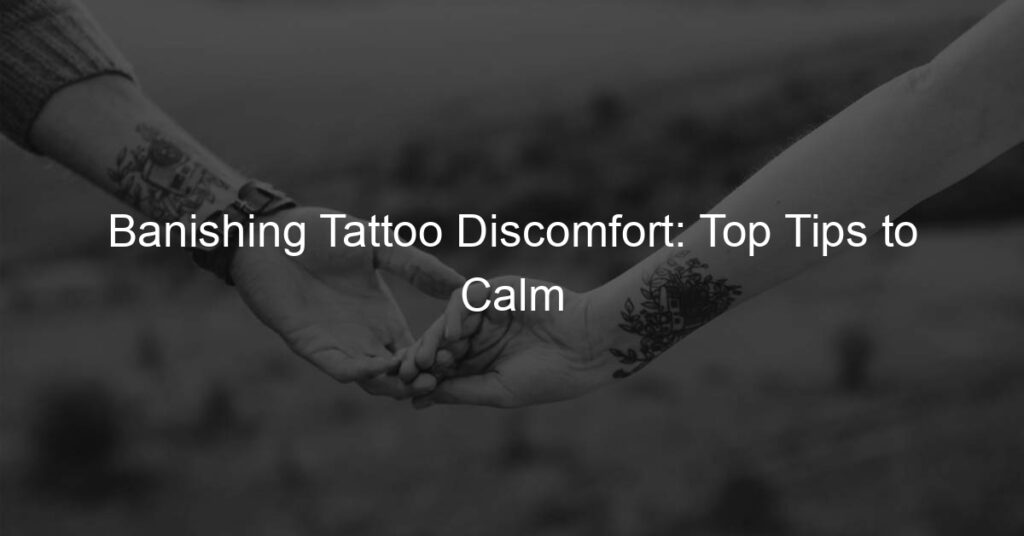
Introduction to Tattoo Irritation
Getting a tattoo is an exciting experience, but it’s also a significant change for your skin. Sometimes, your skin might react in ways you didn’t expect, leading to what we call tattoo irritation. In this section, we will discuss the common causes of tattoo irritation and how to recognize its symptoms.
-
- Understanding the common causes of tattoo irritation
Tattoo irritation can be caused by a variety of factors. One of the most common causes is an allergic reaction to the ink used in the tattoo process. Some people might be allergic to certain colors of ink, particularly red, green, or yellow. Other common causes include improper aftercare, infection, and the skin’s natural reaction to the trauma of the tattooing process.
-
- Recognizing the symptoms of tattoo skin irritation
Recognizing the symptoms of tattoo irritation is crucial in addressing the issue promptly. Common symptoms include redness, swelling, and itching around the tattooed area. In some cases, you might also notice small bumps or a rash. If the irritation is due to an infection, the tattooed area might feel warm to the touch and you might experience fever or chills. It’s important to remember that while some redness and swelling are normal after getting a tattoo, prolonged or severe symptoms could indicate a problem.
In the following sections, we will delve deeper into the tattoo healing process, how to stop tattoo irritation, and ways to prevent tattoo itch. We will also provide you with a comprehensive tattoo care guide and remedies for tattoo irritation. By understanding these aspects, you can ensure a smooth and comfortable tattoo healing process.
The Tattoo Healing Process
Understanding the tattoo healing process is crucial for anyone who has just gotten a new tattoo or is considering getting one. This process involves four main phases: the initial healing phase, the peeling phase, the itching phase, and the final healing phase. Each phase has its own characteristics and requires different care measures.
-
- Initial Healing Phase
The initial healing phase begins immediately after you get your tattoo. During this time, your skin might feel like a sunburn. It’s normal to see some redness, swelling, and a little bleeding. The tattooed area will also start to form a scab. It’s important to keep the tattoo clean and moisturized during this phase to prevent infection and promote healing.
-
- Peeling Phase
After a few days, you’ll enter the peeling phase. This is when the top layer of your skin starts to peel off, revealing the new skin underneath. It might look like your tattoo is fading, but don’t worry! This is just the old skin shedding. Avoid picking or scratching at the peeling skin as it can damage the tattoo.
-
- Itching Phase
The itching phase usually starts a week or so after getting your tattoo. This is a sign that your tattoo is healing. However, the itch can be quite bothersome. Resist the urge to scratch as it can lead to scarring and damage the tattoo. Instead, apply a moisturizer to soothe the itch.
-
- Final Healing Phase
The final healing phase is when the tattooed skin has fully healed. This typically takes about 2-4 weeks, but it can vary depending on the size and location of the tattoo, and your body’s healing process. Your tattoo’s colors should be vibrant, and the skin should feel smooth. Continue to moisturize and protect your tattoo from the sun to maintain its appearance.
Remember, everyone’s body heals at a different pace. If you notice any signs of infection, such as excessive redness, swelling, or pus, contact a healthcare professional immediately. Proper care during each phase of the tattoo healing process will ensure your tattoo looks its best for years to come.
How to Stop Tattoo Irritation
Experiencing irritation after getting a tattoo is common, but it doesn’t have to be a long-term issue. With proper care and attention, you can alleviate discomfort and promote faster healing. Here are some essential tattoo aftercare tips to help you stop tattoo irritation.
Tattoo Aftercare Tips
Proper aftercare is crucial to prevent tattoo irritation and ensure the longevity of your new ink. Here are some key steps you should follow:
- Proper cleaning and drying:Keeping your tattoo clean is vital to prevent infection and irritation. Use a mild, fragrance-free soap to gently clean the tattooed area. Rinse thoroughly and pat dry with a clean towel. Avoid rubbing the area as it can cause irritation.
- Applying a suitable moisturizer:Moisturizing your tattoo can help soothe irritation and speed up the healing process. Use a fragrance-free, hypoallergenic moisturizer to hydrate your skin. Apply a thin layer and let it absorb into the skin. Avoid over-moisturizing as it can lead to clogged pores and breakouts.
- Avoiding sun exposure:Direct sunlight can cause severe damage to a new tattoo. UV rays can fade the ink and prolong the healing process. It’s best to keep your tattoo covered or wear a high SPF sunscreen when going outside. Remember, a well-protected tattoo is a long-lasting tattoo.
By following these simple aftercare tips, you can significantly reduce tattoo irritation and ensure your new artwork heals properly and stays vibrant for years to come.
Reducing Tattoo Inflammation
When it comes to managing tattoo irritation, one of the key areas to focus on is reducing inflammation. Inflammation is a natural response of your body to injury, and a fresh tattoo is essentially a form of injury. However, excessive inflammation can lead to discomfort and prolong the healing process. Here are some effective ways to reduce tattoo inflammation:
- Using Over-the-Counter Anti-Inflammatory Creams: Over-the-counter anti-inflammatory creams can be a great help in reducing tattoo inflammation. These creams contain ingredients like hydrocortisone, which can help to reduce swelling and redness. Apply a thin layer of the cream to the tattooed area, following the instructions on the packaging. Remember, less is more when it comes to applying these creams.
- Applying Cold Compresses: Cold compresses can be a simple yet effective way to reduce inflammation. The cold temperature helps to constrict the blood vessels, which can reduce swelling and pain. Wrap a cold pack or a bag of frozen peas in a clean towel and apply it to the tattooed area for 15-20 minutes at a time. Make sure to give your skin a break between applications to prevent frostbite.
- Taking Oral Anti-Inflammatory Medications: If the inflammation is severe, you might consider taking oral anti-inflammatory medications. Non-prescription drugs like ibuprofen can help to reduce inflammation and pain. However, it’s important to consult with a healthcare professional before starting any new medication.
Remember, everyone’s body reacts differently to tattoos. What works for one person may not work for another. It’s important to listen to your body and give it the care it needs during the healing process. If your tattoo inflammation doesn’t improve or gets worse, don’t hesitate to seek medical attention.
Preventing Tattoo Itch
One of the most common issues that people face after getting a tattoo is itching. This can be quite uncomfortable and may even lead to skin damage if not properly managed. However, there are several effective ways to prevent and manage tattoo itch. Let’s explore some of these solutions.
Itchy Tattoo Solutions
There are several strategies that can help alleviate the itchiness associated with a new tattoo. Here are a few methods that have proven to be effective:
- Using a specialized tattoo lotion: Specialized tattoo lotions are designed to soothe the skin and reduce inflammation. They often contain ingredients like aloe vera and vitamin E, which are known for their skin-soothing properties. Applying this lotion to your tattoo can help to reduce itchiness and promote healing.
- Avoiding scratching the tattoo: While it may be tempting to scratch your itchy tattoo, this can lead to skin damage and infection. Instead, try to resist the urge to scratch and apply a soothing lotion or cold compress to the area instead.
- Staying hydrated: Keeping your skin hydrated can help to reduce itchiness. This can be achieved by drinking plenty of water and using a moisturizer on your skin. When your skin is well-hydrated, it is less likely to become dry and itchy.
By following these tips, you can help to prevent and manage tattoo itch, ensuring that your new piece of art heals properly and looks its best.
Tattoo Irritation Remedies
When you get a new tattoo, it’s normal to experience some skin irritation. This is a part of the healing process. However, if the irritation persists, there are some remedies you can try. Let’s explore these solutions.
Tattoo Skin Irritation Treatment
There are three main ways to treat tattoo skin irritation. These are:
- Applying a topical steroid cream: Topical steroid creams can help reduce inflammation and itching. They work by suppressing your body’s immune response, which can help soothe irritated skin. However, it’s important to use these creams sparingly and under the guidance of a healthcare professional.
- Using a hypoallergenic tattoo balm: Hypoallergenic tattoo balms are designed to soothe and protect your skin without causing further irritation. They are free from common allergens and are gentle on sensitive skin. These balms can also help keep your tattoo vibrant and healthy-looking.
- Consulting a dermatologist: If your tattoo irritation doesn’t improve with over-the-counter treatments, it’s a good idea to consult a dermatologist. They can examine your skin and recommend a suitable treatment plan. In some cases, they may prescribe a stronger topical cream or suggest other treatments.
Remember, everyone’s skin reacts differently to tattoos and treatments. What works for one person may not work for another. It’s important to listen to your body and seek professional advice if needed.
Table: Tattoo Irritation Remedies
| Remedy | Description |
|---|---|
| Topical Steroid Cream | Reduces inflammation and itching. Use sparingly and under guidance of a healthcare professional. |
| Hypoallergenic Tattoo Balm | Soothes and protects skin without causing further irritation. Keeps tattoo vibrant and healthy-looking. |
| Consult a Dermatologist | If irritation doesn’t improve with over-the-counter treatments, a dermatologist can examine your skin and recommend a suitable treatment plan. |
Tattoo Care Guide
Getting a tattoo is a big decision. It’s not just about choosing the perfect design, but also about taking proper care of it. In this guide, we will discuss three key aspects of tattoo care: choosing the right artist and studio, following aftercare instructions, and understanding the signs of an infected tattoo.
-
Choosing the Right Tattoo Artist and Studio
Choosing the right tattoo artist and studio is the first step towards a safe and satisfying tattoo experience. Look for a reputable studio that maintains high standards of cleanliness and hygiene. The artist should be experienced, skilled, and willing to answer all your questions. Remember, a good artist will always prioritize your comfort and safety.
-
Following the Aftercare Instructions Provided by the Artist
Once your tattoo is done, the artist will provide you with aftercare instructions. These may include cleaning the tattoo with mild soap, applying a thin layer of ointment, and avoiding sun exposure. It’s crucial to follow these instructions to the letter to prevent infection and ensure your tattoo heals properly.
-
Understanding the Signs of an Infected Tattoo
Despite your best efforts, tattoos can sometimes get infected. Signs of an infected tattoo include excessive redness, swelling, and pus. If you notice any of these symptoms, it’s important to seek medical attention immediately. Remember, early detection and treatment can prevent serious complications.
In conclusion, tattoo care is a multi-step process that begins with choosing the right artist and studio and continues with diligent aftercare. By understanding the signs of an infected tattoo, you can take quick action and prevent further issues. Remember, a tattoo is a lifelong commitment, so it’s worth taking the time to care for it properly.
Conclusion: Soothing Tattoo Itch and Irritation
As we come to the end of our discussion on tattoo itch and irritation, let’s take a moment to recap the key takeaways and underscore the importance of proper tattoo aftercare.
-
- Recap of key takeaways:
Throughout this guide, we’ve learned that tattoo irritation is a common part of the healing process. It’s essential to understand how to soothe the itch and irritation to ensure the tattoo heals properly. We’ve covered various methods to stop tattoo irritation, including keeping the area clean, moisturizing regularly, and avoiding scratching. We’ve also explored different remedies for tattoo irritation, such as using over-the-counter creams and natural remedies like aloe vera.
-
- Importance of proper tattoo aftercare:
Proper tattoo aftercare is crucial for the healing process and to maintain the vibrancy of your tattoo. It involves cleaning the tattooed area gently, applying a thin layer of moisturizer, and avoiding exposure to direct sunlight. Remember, a well-cared-for tattoo not only looks better but also heals faster, reducing the chances of infection and itchiness.
In conclusion, dealing with tattoo itch and irritation can be a bit challenging, but with the right knowledge and care, it’s entirely manageable. Always remember that the healing process is just as important as getting the tattoo itself. So, take good care of your new tattoo, and it will remain a vibrant and meaningful piece of art for years to come.






